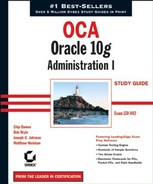1.1. The Oracle Product Family
Oracle Corporation is generally thought of as a database company—and for good reason. Oracle has been a leader in the development of reliable, scalable, and recoverable database technologies for more than 25 years. With the release of Oracle 10g, Oracle has further enhanced its reputation as an industry leader by producing a feature-rich, yet easy-to-manage database that can handle data from the busiest transactional systems to the largest data warehouses. However, Oracle Corporation also produces many other products that support a variety of datarelated business activities. Currently, Oracle's product family consists of the following products and services:
Oracle Database 10g
Oracle Application Server 10g
Oracle Developer Suite
Oracle Applications 11i
Oracle Collaboration Suite
Oracle Services
Each of these products or services is described in detail in the following sections.
NOTE
The following information regarding Oracle's products is included to provide a framework for understanding where Oracle 10g fits within the larger Oracle product line. This information is not part of the exam objectives.
1.1.1. Oracle 10g
Oracle 10g was released as version 10.1.0.2 in spring 2004. This release of Oracle's flagship database product introduces many new features, but the three primary thrusts are ease of management, enhanced scalability, and improved performance management.
The ease of management features include the automatic management of disk storage allocated to the database, proactive monitoring and self-tuning of the database's memory structures, preconfigured database alerts, and enhanced, web-based tools for monitoring and managing the entire Oracle architecture.
Scalability and performance improvements are largely based on Oracle's grid computing model. Grid computing is intended to allow businesses to move away from the idea of many individual servers, each of which is dedicated to a small number of applications. When configured in this manner, applications often either do not fully utilize the server's available hardware resources such as memory, CPU, and disk or fall short of these resources during peak usage. By comparison, databases running under Oracle's grid computing model can be spread across as few or as many servers as needed so as to make the most efficient use of each of the available hardware resources at all times. At the same time, Oracle 10g 's automated performance monitoring and tuning mechanisms dynamically adjust the database's allocation of these resources to improve performance.
There are five editions of Oracle 10g:
Table 1.1 compares these versions.
NOTE
Most of the examples in this book are based on the Enterprise Edition.
1.1.2. Oracle Application Server 10g
Oracle's Application Server 10g is used to deploy web-based applications that, like the database, must be highly reliable and scalable to thousands of users. Like the database, Oracle Application Server 10g is also available in a number of versions, but all versions include full Java functionality and Oracle's HTTP server, with additional components such as portals, forms and reports servers, single sign-on capabilities, and wireless connectivity also available.
1.1.3. Oracle Developer Suite
Oracle's Developer Suite consists of several products that can be used to design, develop, and distribute web-based applications. These tools include the following:
Oracle Designer for gathering business requirements and designing applications
Oracle JDeveloper for creating Java-based applications
Oracle Forms and Reports Developer for creating and deploying custom forms and reports
Oracle Discoverer for developing and distributing ad hoc reporting capabilities against application data
Oracle Warehouse Builder for designing and deploying data marts and warehouses.
Each of these tools is designed to integrate seamlessly with the Oracle database and application server products to provide a robust application development environment.
1.1.4. Oracle Applications 11i
Oracle's database, application server, and developer products make up the core infrastructure of the E-Business Suite of products collectively called Oracle Applications 11i. Oracle Applications 11i is composed of a number of modules that are used to manage the financial, personnel, manufacturing, order management, sales, service, and asset data of both businesses and public sector organizations.
1.1.5. Oracle Collaboration Suite
Oracle's Collaboration Suite offers a comprehensive system that integrates all of a business's communication technologies, from e-mail, voice mail, and faxes to wireless connectivity and web conferencing. Like Oracle Applications 11i, the Collaboration Suite also uses Oracle's database and application server technologies as the core technology infrastructure. This provides a scalable and reliable platform for true enterprise-wide collaboration.
1.1.6. Oracle Services
In addition to software development, Oracle also offers a variety of technical support and consulting services. Technical support is delivered primarily through Oracle's MetaLink website and is available to all customers with current maintenance agreements. In addition to this support, Oracle Services also offers consulting services to help customers select, install, and configure the Oracle technologies that best meet their needs.
NOTE
You can access Oracle's MetaLink support site at http://metalink.oracle.com. This site provides a wealth of patches, documentation, notes, white papers, and user forums.
NOTE
A valid Custom Support Identifier(CSI) is required to create a MetaLink account. A unique CSI number is usually issued for each Oracle product that is purchased.
Another service offered by Oracle is education. Oracle develops and delivers instructor-led and web-based training courses for all their products. These courses are taught at Oracle University sites and Oracle Approved Education Center locations throughout the world. Oracle Education is also responsible for coordinating all of Oracle's certification programs, including the Oracle Database 10g Oracle Certified Associate (OCA) and Oracle Certified Professional (OCP) certifications for which this book helps you prepare.
